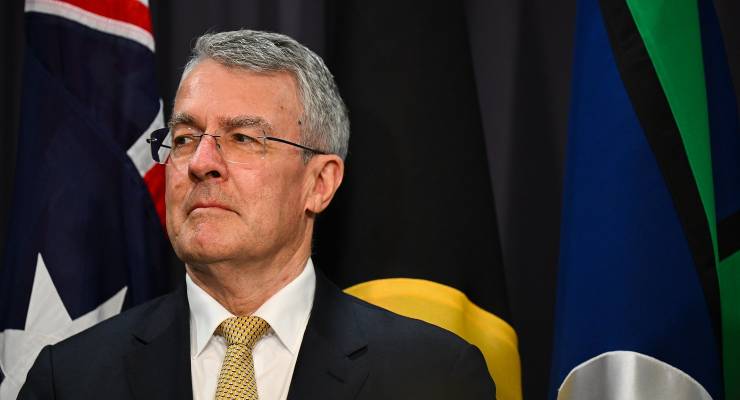
Imagine, after reading this article, that you spot something wrong at work. Maybe you are a public servant and notice the numbers on a project don’t add up. Or perhaps you work for a resources company, and you learn of an oil spill causing significant environmental harm.
Almost every Australian in the workforce is covered by a dedicated whistleblower protection regime. These laws are fragmented and contain more than a few loopholes — they are at best imperfect — but their purpose is fundamentally sound. If someone sees something wrong at work, whether they are a tradie, a teacher or a technical expert, they can speak up and be protected against any retaliation. That is good for our democracy.
But once you have identified this suspected wrongdoing, where do you go for guidance and support? Therein lies the critical gap in Australia’s integrity framework. Blowing the whistle on your colleagues, or even your boss, is a difficult experience at the best of times. But right now there is no agency tasked with helping whistleblowers navigate the process.
Without the support of a whistleblowing body — a whistleblower protection authority — too many whistleblowers are staying silent. Our democracy suffers as a result.
These are not novel observations. The first-ever federal inquiry into whistleblower protections, by a Senate committee in the early 1990s, recommended the establishment of a whistleblowing agency in tandem with a federal whistleblowing law. The call was clear: legal protections are important, but they need institutional infrastructure around them to be effective.
Another parliamentary inquiry in 2017, amid the banking scandals that focused attention on whistleblowing, reiterated this proposal. The bipartisan committee endorsed the “creation of a one-stop-shop whistleblower protection authority to cover both the public and private sectors”. Labor took this pledge to the 2019 election, promising to “strengthen protections for whistleblowers through the establishment of a whistleblower protection authority”.
But five years later, there is no federal whistleblower protection authority. Despite the efforts of integrity-minded crossbenchers Cathy McGowan and Helen Haines, and the Greens, to include a whistleblowing body within an earlier iteration of the National Anti-Corruption Commission proposal, this did not come to fruition. The Albanese government is presently only considering the idea, as part of the next phase of whistleblowing reform
A dedicated whistleblowing body has never been more urgent. Following a decade of declining transparency and integrity in government, Australians are rightly worried about speaking up. In recent years journalists were raided, whistleblowers were prosecuted, and trials were shrouded in secrecy. The chilling effect of these events is very real.
I see this every day in my practice as a lawyer for whistleblowers — clients who are scared of the consequences of doing the right thing. A whistleblower protection authority is the institutional reform that can reverse the tide — and a prime way for Labor to prove its integrity credentials.
Consider some of the scandals the government is currently seeking to address. Australia’s war crimes in Afghanistan — called out by brave whistleblowers, to the media and the Brereton inquiry. The mistreatment of Australians in aged care, exposed by a recent royal commission. The furore surrounding the Big Four consulting firms. Or the shocking toll of robodebt.
It is no accident that stronger whistleblower protections are at the forefront of solutions to these problems. The Brereton inquiry noted the importance of the Australian Defence Force ensuring that its whistleblowers prosper. The government is currently enacting stronger protections for tax and aged care whistleblowers, while one of the parliamentary inquiries into the Big Four is considering the inadequacy of existing protections.
And might robobdebt have been avoided, if whistleblowers were protected when they raised concerns? Certainly one of the courageous public servants who did speak up, Jeannie-Marie Blake, thinks so. In a recent interview, Blake said that an independent whistleblowing body would ensure that more public servants could call out wrongdoing. “Currently,” she said, “you are left weighing up whether you can live with the consequences of going on the record or live with the consequences for the public if you don’t speak out.”
A whistleblower protection authority is the integrity architecture that can help expose wrongdoing before too long, and protect those who speak up. That is why, at Parliament this week, the Human Rights Law Centre, Transparency International Australia and Griffith University — joined by crossbench MPs Andrew Wilkie and Helen Haines, and independent Senator David Pocock and Liberal Senator Paul Scarr — are launching draft design principles for a whistleblowing body, to help inform a solution to Australia’s integrity gap.
Attorney-General Mark Dreyfus has long been a champion of whistleblowing. As a backbencher, he chaired the committee that did vital work in pursuing federal public sector whistleblower protections — protections that subsequently became law during his first stint as A-G, in the last days of the Gillard government. And one of his early acts upon regaining the role in 2022 was to drop the prosecution of whistleblower Bernard Collaery.
In a recent essay for The Monthly, Dreyfus described his passion for “building strong public institutions”. He observed, of the importance of accountability and integrity, that these democratic values are not only “ends in themselves”, and ways to prevent tragedies like robodebt, but that they also “lead to better government.”
By establishing a whistleblowing body, Dreyfus can be true to his word and leave a fitting legacy. By helping whistleblowers speak up, a whistleblower protection authority would be good for accountability and integrity and ensure better government for all Australians.
Kieran Pender is a senior lawyer at the Human Rights Law Centre’s Whistleblower Project, Australia’s first dedicated legal service for whistleblowers.
Does Australia need stronger whistleblower protections? Let us know your thoughts by writing to letters@crikey.com.au. Please include your full name to be considered for publication. We reserve the right to edit for length and clarity.








Dreyfus just tried to install a Labor mate, NSW Supreme Court Justice Stephen Rothman, as a deputy commissioner for the new NACC. He also stood in the way of public hearing for the NACC. This is the problem. Both the major parties play “games of mates” and they both have skeletons in the closet, so they hate transparency and accountability … and whistleblowers. The only answer is to vote for independents like Haines, Wilke and the Teals who have nothing to lose by having strong integrity bodies and whistleblower protections.
Rothman was part of the panel of 3 judges of the NSW Supreme Court to reject the appeal by the Customs/airport W/B against his conviction, along with Virginia Bell who had already been promised a move to the High Court.
As a “human rights lawyer”, Dreyfus makes a poor apparatchik.
Every example the article gives of ways a whistleblower might have exposed a scandal, or exposed it sooner, only shows why ministers and senior APS officials will fight to their last breath to prevent any effective protection for whistleblowers. The cruel persecution of whistleblowers is not done only to punish them, and is not an accident. It is wholly deliberate and intentional. The whole purpose is to intimidate anybody who is thinking of going public. Showing what whistleblowers could do only reinforces their determination to stop them doing it.
There is a ghastly paradox in the various journalistic exposés of the horrific treatment of whistleblowers. On the one hand, it does raise public awareness and sympathy for the monstrous injustice of it all. On the other hand, all such reporting is doing exactly what the government wants — reinforcing the sense of terror that must be felt by anyone who is thinking of exposing a scandal. Such people should be terrified. There’s a high probability they will lose their job, their savings, their family relationships, their homes, their friends, and their mental and physical health, even if they do not and up in gaol.
I wonder what the colour the sky is on this writer’s planet?
He seems to imagine that this pack of chancers, grifters & meme thieves masquerading as Labor have the slightest desire, intention or motivation to protect whistleblowers.
Anyone remember Kevin 07 who proclaimed the need to reform the law due to the 2005 Customs/Sydney airport W/B being charged?
When he invoked the bloke’s name in speeches, promised to protect him & others and made this part of the 2007 Manifesto?
Nah, me neither.
As for Dreyfus, would that be the soi-disant “respected human rights lawyer & advocate” or, as above “…(who) has long been a champion of whistleblowing”?
The space-waster who, given the job of reform, dawdled and dithered for almost 3yrs until shamed into action by the Independent MP Andrew Wilkie proposing a Private Member’s Bill to fill the hole where Dreyfus’ soul was not?
The piece of crap Bill that was finally wheeled out, in the dying daze of the 2nd Coming of Krudd (NOT Gillard as stated) government, hilariously (to the bloodless bureaucrats who’d thunk it up) misnamed something like Public interest Disclosure (Protection) Bill was specifically and carefully designed to make the plight of persons so minded as to disclose malfeasance, incompetence and corruption far, far worse.
It required them, in the instance, to report a matter to one’s senior officer – almost always either the source or complicit in abuses such as those above.
This of course just painted a yooog target on their backs when the information became public as demonstrated by the ATO’s Boyle, the Army’s McBride and others whose cases have not disturbed that turgid mill pond of complacency know as the media.
The only way to currently expose wrongdoing is anonymously but one needs to be sure the anonymity will not be breached. Having no face or name to a complaint lacks the credibility afforded to a visible whistleblower – it denies the personal & human elements.
All governments enjoy the cloak of coverup, they are reluctant to facilitate removing it.
Needed is an independent, omnipotent agency to which a whistleblower could go, with the evidence, then said agency takes it from there, maintaining the whistleblower’s anonymity by erasing their personal details. Never happen.
Blowing the whistle only to blow yourself up, simply has to change.